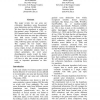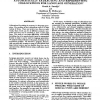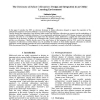107
click to vote
SIGIR
2002
ACM
15 years 1 months ago
2002
ACM
Previews and overviews of large, heterogeneous information resources help users comprehend the scope of collections and focus on particular subsets of interest. For narrative docu...
CORR
2000
Springer
15 years 1 months ago
2000
Springer
This paper revisits the one sense per collocation hypothesis using fine-grained sense distinctions and two different corpora. We show that the hypothesis is weaker for fine-graine...
144
click to vote
ACL
1990
15 years 3 months ago
1990
Collocational knowledge is necessary for language generation. The problem is that collocations come in a large variety of forms. They can involve two, three or more words, these w...
114
click to vote
ACL
1997
15 years 3 months ago
1997
In this paper, we describe a method for automatically retrieving collocations from large text corpora. This method retrieve collocations in the following stages: 1) extracting str...
LREC
2008
15 years 3 months ago
2008
This paper deals with the relationship between weblog content and time. With the proposed temporal mutual information, we analyze the collocations in time dimension, and the inter...
LREC
2008
15 years 3 months ago
2008
The project presented here is a part of a long term research program aiming at a full lexicon grammar for Polish (SyntLex). The main concern of this project is computer-assisted a...
LREC
2010
15 years 3 months ago
2010
This article discusses the treatment of collocations in the context of a long-term project on the development of multilingual NLP tools. Besides "classical" two-word col...
117
click to vote
LREC
2010
15 years 3 months ago
2010
In this paper, I introduce the DICI, an electronic dictionary of Italian collocations designed to support the acquisition of the collocational competence in learners of Italian as...



